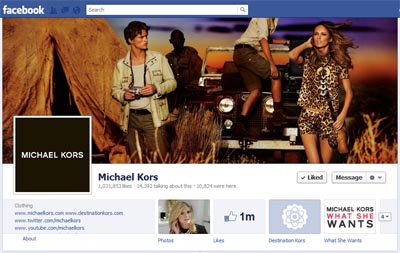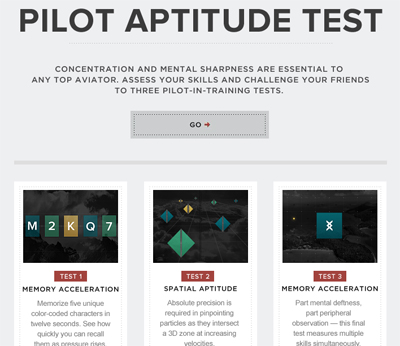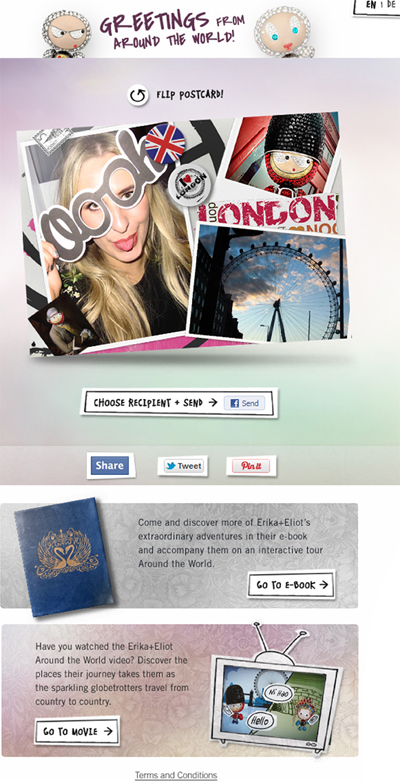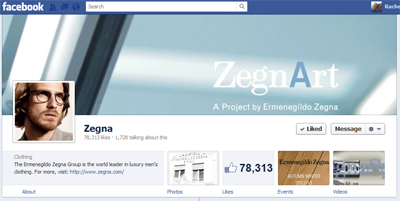L2 Think Tank: Michael Kors, IWC top Facebook IQ
Marketers including Michael Kors, IWC, Swarovski, Bulgari, Christian Dior, Oscar de la Renta and Tiffany & Co. rounded out the top 20 in the 2012 L2 Think Tank Facebook IQ study due to their innovation, invitation of two-way dialogue and cross-channel incorporation of social media.
Most of the brands that did well in this study not only created engagement with consumers, but offered an environment where a two-way dialogue was welcome. However, other marketers including Patek Philippe, De Beers, Harvey Nichols, Baccarat, Rolex and Ermenegildo Zegna did not fare so well.
”About one-third of the brands are still using Facebook as a broadcast channel and not allowing social aspects like a two-way conversation to happen,” said Daniella Caplan, New York-based associate at L2 Think Tank and leader of the IQ study. “Some are not encouraging user-generated content and not taking advantage of the social network and the power of a relationship to form between the fans.
“We are not only looking at fan-brand engagement, but what kind of community they are fostering on their page,” she said. “Strong integration coupled with ad can boost programming that they are engaging in.
“Some luxury brands are doing great stuff but without the power of integration of advertising behind this programming, it is not garnering the kind of growth or interaction that we feel it should.”
In this Facebook IQ, brands were based 35 percent on size and growth, 35 percent on engagement, 20 percent on programming and 10 on integration.
Please click here to download the study.
Not socially awkward
For the first time, L2 took out automotive and spirits brands from the roster and added in specialty retailers.
Michael Kors was the most Facebook-savvy of the luxury marketers and the only one to receive a genius rating. It was tied for the No. 3 spot.
In fact, Michael Kors jumped 100 spots from last year’s IQ, according to the brand.
The brand experienced a 270 year-over-year fan growth through strong and innovative programming that was well integrated across their digital platforms, according to the study.
Indeed, Michael Kors’ campaigns have held the bulk of their content on Facebook and the social network site has played a role in engagement and sales.
Michael Kors’ “What She Wants” Mother’s Day campaign on Facebook
“Social media is now a fully integrated aspect of our brand,” said Lisa Pomerantz, senior vice president of global communication and marketing at Michael Kors, New York. “It influences our current generation, communication efforts and the way in which we develop and implement large-scale campaigns.
“More importantly, it has become the driving force in how we communicate with our customers on a global scale,” she said. “As a leader in the social space, we look forward to only furthering our growth and innovation.”
In addition, watchmaker IWC cracked the top 10 right below Michael Kors at No. 6.
IWC was lauded for its “Pilot Aptitude Test,” where consumers can test their memory acceleration and spatial aptitude via tests to mimic how pilots train.
Pilot aptitude test on IWC’s Facebook page
Meanwhile, Swarovski, Bulgari and Tiffany & Co. picked up the slack in the jewelry sector by placing No. 7, No. 12 and No. 18, respectively.
Swarovski could have gotten points for its multiple Facebook applications including Erika+Eliot Around the World and Be Amazing that pushed different collections (see story).
Swarovski’s Erika+Eliot Facebook app
Meanwhile, Bulgari was one of the first brands to introduce Facebook commerce for its Jasmin Noir fragrance and Tiffany hosts most of the content for the What Makes Love True campaign on its social media page.
Christian Dior and Oscar de la Renta also made Facebook waves in luxury fashion.
“Brands that are doing really well are understanding that Facebook is part of a longer digital strategy and should not live in isolation of other digital marketing efforts,” Ms. Caplan said.
More face time
Brands including Zegna, De Beers, Harvey Nichols, Baccarat and Patek Philippe posted the lowest scores in the study.
Watchmakers Patek Philippe and Rolex do not even have Facebook pages, leaving large fan bases with no sense of communication on the social network.
Meanwhile, Zegna’s use of augmented reality is innovative and impressive, but the brand needs to strengthen its fanbase to remain relevant, according to L2. The same is for London-based retailer Harvey Nichols.
Zegna needs a heftier Facebook following
De Beers made good first steps through videos, events and many images, but could stand to add a few unique tabs for campaigns, per L2.
Even though community growth is up, engagement across prestige communities has declined.
The average interaction rate or the percentage of community liking or commenting on brand posts has declined almost 50 percent year over year, according to the report.
The move to the Timeline graph does not seem to be a growth driver, in fact, prestige brands added 125 percent more fans in the 50 days before the launch than they did 50 days after the mandatory switch.
Louis Vuitton’s use of the Timeline
A major divider between brands with high IQs and those without have a two-way conversation barrier. In fact, 20 percent of brands do not allow two-way conversations and one-third do not allow brands to post on their walls.
“Some brands are doing well, and those that are still engaging with fans that have more than 1 million declined the least in engagement,” Ms. Caplan said. “Those that put efforts in trying to build a strong community through engaging programming are managing to strike that balance between growth and engagement.
“With the rise in elements such as social shopping, we are going to see them being more integrated in the digital world and have a good community, which is really imperative for emerging and innovating programming that we’ll be seeing in this year and next,” she said.
Final Take
Rachel Lamb, associate reporter on Luxury Daily, New York






